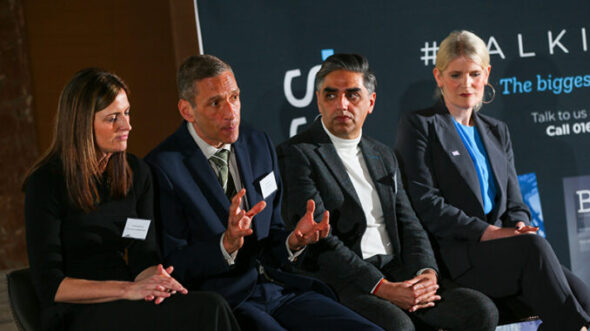Catherine joins expert charity panel in the latest Tees Business Live
24 February 2023

24 February 2023

Charity leaders have made a call to action to the Teesside business community.
Speaking at the latest Tees Business LIVE event, four charity bosses told businesses their support – whether financial or otherwise – can make a vital difference, especially in these turbulent economic times.
Around 80 people attended the lunchtime event, which was organised by Tees Business in partnership with event hosts Wynyard Hall.
It featured a Q & A session with an expert panel comprising Catherine Devereux, Founder and Trustee of the Headlight Project, Teesside Hospice CEO David Smith, Daisy Chain CEO Neeraj Sharma and Claire Preston of Open North Foundation, the Halo Project and the Power of Women Campaign.
And all four panelists urged businesses to consider backing four local good causes.
Neeraj Sharma said the Daisy Chain autism complex in Norton was “built, brick by brick” by Teesside businesses – but that, at the moment, “we receive very little financial support from businesses.”
He added: “We have fantastic young people with brilliant attendance levels who really want to find work, so I’m asking you to work with us and find out more about us.
“The very fact we have one person in 50 being recognised with autism means we want to work with you in a way we can support you in your businesses. But equally, if you can support us with our initiatives then please listen out for the activities and events we’ve got going forward.”
Catherine Devereux felt it didn’t mean charities had to compete with each other, saying: “We’re all specialist and niche in what we do – we want all charities to survive.”
And she revealed the Headlight Project, which aims to reduce suicide deaths and provides support for those affected, will soon launch a corporate partnership scheme based on the concept of a truck’s fifth wheel.
She explained: “On a truck, the fifth wheel performs a hugely important task. It’s a U-shaped hitch that adds to the bed of a truck and it allows the driver to connect a cargo – it brings great stability and manoeuvrability to the truck. Like the 5th Wheel of the truck our 5th Wheel Partners & Supporter will provide stability to the charity. With regular income from core partnerships we will be able to help people living through the most tragic of circumstances.”
All agreed it didn’t have to be financial help offered by businesses, with David Smith telling how over Christmas, the donation of a generator kept part of Teesside Hospice open.
He said: “We were having sleepless nights, thinking ‘how on earth are we going to keep the in-patient bit open when we can’t get power in?’ That kind of practical and kind support can make a phenomenal difference to us.”
And Claire Preston agreed there were several ways businesses can help.
She said: “Of course we need money, but it’s not just about that.
“I appreciate time is a finite resource and that can be harder to give than money at times, but you can always be involved, there is always something you can do. Whether it’s a professional service you can offer, whether it’s buying a ticket, whether it’s giving a raffle prize – there are always ways we can do that little bit more.
“I hate asking the same people over and over again but one of the key things is raising awareness, spreading the message and starting conversations. People need to know about what we do and then get involved in the bit they feel comfortable with or have a passion about.”
And when asked by Wynyard Hall sales and marketing manager Ivor Hobbs how firms should decide which charities to choose, the panelists felt it was down to each firm – and, crucially, their staff.
David Smith said: “Don’t you pick it – talk to your employees about what matters to them. It’s got to be a cause employees care about.”
Catherine agreed, saying: “If it means something to just one person in that workforce and the rest of the workforce know they’ve been affected, everyone will engage with it.”
And Mr Sharma said firms could vary support from year to year so different charities get an opportunity.
He added: “If I was looking in at the charity sector, I’d be thinking ‘who do we support and what matters to our customers? What does social responsibility mean to us?’
“See who’s supported in the charity sector already and be honest about it. If your competitor’s supporting a charity, it’s OK for you to say ‘they’ve got that covered, I’m going to support another charity’ rather than ‘my competitor’s supporting that charity so I’m equally going to support it’.
“It’s really about looking within your business and asking what your employees want but also, who are your customers? Your customers want to know how ethical you are as a business.”
For more details about the Headlight Project’s 5th Wheel scheme, contact getinvolved@headlightproject.org
Follow us on Social Media.

Subscribe for the latest newsletter updates.